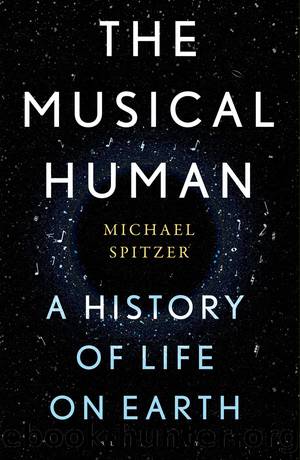The Musical Human by Michael Spitzer

Author:Michael Spitzer
Language: eng
Format: epub
Publisher: Bloomsbury Publishing
Hence the meanings of music were standardised, just like weights, measures and the Chinese script. Chinaâs so-called âcorrelative cosmologyâ, the system by which all aspects of the cosmos (including music) were networked in a web of associations, can seem fantastically superstitious to us. Why was it auspicious, for example, to play pipes in spring, zithers in the summer, chime-bells in the autumn and drums in winter? Because a bamboo pipe obviously helps trees to bud in spring. Silk worms fattening on mulberry leaves during the summer enjoy the sound of zither strings made from silk. Autumn is when the Yang forces of nature retreat, and bells are sounded when an army retires. Finally, that most primeval of instruments, the drum, assists the winter sun during the crisis of the solstice.83
Meanwhile, to assure compliance, folksongs and ceremonial music from the far reaches of the empire were funnelled for approval through a central Music Bureau (Yue Fu).84 It is testament to the staggering longevity of Chinese civilisation that the Yue Fu, established by the Han, closed its doors for the last time in 1911 only with the collapse of the final dynasty, the Qing.
This practical, civilising use of music reflects the triumph of Confucianism, the Hanâs state religion. But it went against the contemplative and somewhat passive nature of Taoism. In some ways, these two religions represent the Yin and Yang of Chinese culture, and the tension between them throbs even at the heart of its most prestigious instrument, the seven-string zither called the qin (or Guqin, its modern version). A qin is a long, flat, hollow wooden box, about three feet long, with the silk strings stretched out lengthwise. Its soft, delicate sounds made it an ideal instrument for the gentleman scholar, who is typically portrayed in Chinese prints playing it in lonely bamboo groves on high mountains, where its sounds meld with the wind and the silence. The qin is an instrument both of nature and of spiritual reverie. There are many pictures of Confucius meditatively playing the qin in his garden, or teaching it to his disciples (see Figure 7.4). Yet the calm image misleads: in the sageâs Analects, the instrument features in a far more worldly â i.e. Confucian â capacity as a tool, even a weapon, of politics. In one passage, the Master fobs off a petitioning visitor with the excuse that he is too ill to see him, but then takes up his qin and plays it through the door, making sure that the departing guest can hear that Confucius is in perfect health.85 In another, he rejects the petition of a man from the north, whose wild playing on the qin displeases him.86 Much later, during the cultural efflorescence of the Tang Dynasty, Wang Wei (ad 699â759) â poet, painter, composer and perhaps Chinaâs greatest all-round artist â gently skewers Confucianism in a poem that alludes to a legend in the Zhuangzi, an ancient collection of Chinese fables.87 An anecdote relates how one day an
Download
This site does not store any files on its server. We only index and link to content provided by other sites. Please contact the content providers to delete copyright contents if any and email us, we'll remove relevant links or contents immediately.
The Goal (Off-Campus #4) by Elle Kennedy(12434)
Kathy Andrews Collection by Kathy Andrews(10520)
Diary of a Player by Brad Paisley(6866)
What Does This Button Do? by Bruce Dickinson(5527)
Assassin’s Fate by Robin Hobb(5237)
Big Little Lies by Liane Moriarty(4880)
Pale Blue Dot by Carl Sagan(4001)
Sticky Fingers by Joe Hagan(3454)
The Heroin Diaries by Nikki Sixx(2932)
The Death of the Heart by Elizabeth Bowen(2901)
Beneath These Shadows by Meghan March(2718)
The Help by Kathryn Stockett(2704)
Confessions of a Video Vixen by Karrine Steffans(2675)
How Music Works by David Byrne(2526)
Jam by Jam (epub)(2489)
Harry Potter 4 - Harry Potter and The Goblet of Fire by J.K.Rowling(2416)
Strange Fascination: David Bowie: The Definitive Story by David Buckley(2367)
Petty: The Biography by Warren Zanes(2237)
Darker Than the Deepest Sea by Trevor Dann(2207)
